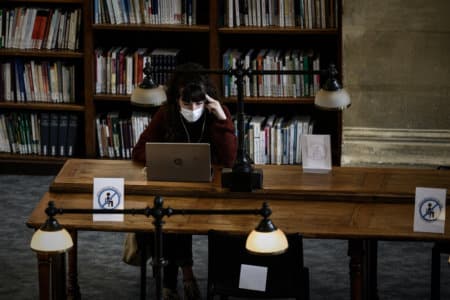
Nowadays, it comes to no one’s surprise that students are grappling with anxiety, depression, mental burnout, and sometimes even suicidal thoughts.
Between the seemingly endless grind of study sessions to conquer deadlines and exams, increasing barriers to education, and rising costs, this mental health crisis among university students could be seen from a mile away.
Inside Higher Ed’s 2024 Student Voice survey reported that two in five students say their mental health issues severely impact their ability to focus and succeed in their studies, with 10% of students rating their mental health as “poor”.
It is the silent struggle many students face, a reminder that sometimes, even the brightest minds need a moment to recharge.
So if you’re feeling this way, pause and take a breath, it can make a big difference in getting you back on track.
Get it right: mental burnout vs depression
Ever heard someone say, “I’m burned out,” and thought, “Oh, they’re depressed”?
Well, these two aren’t quite the same thing.
Depressive disorder, also known as depression, is a common mental disorder.
It’s a prolonged feeling of sadness or a lack of interest that can seep into every part of life, from friendships to family, to work or school.
On the other hand, burnout is recognised by the World Health Organization (WHO) as an “occupational phenomenon.”
It’s not a mental health disorder but instead a group of symptoms associated with chronic stress. It takes a physical, mental, and emotional toll, leaving one feeling drained and overwhelmed.
Additionally, what triggers burnout in one person might not affect someone else in the same way. We all have different thresholds, and it’s wise to avoid assumptions about what others are experiencing.
This brings us to the long-standing assumption that STEM — that is, the science, technology, engineering, and mathematics fields — are more challenging than the arts.
Yes, STEM students need analytical skills and scientific understanding. However, that’s not to say arts students have it easy.
Their path to recognition often involves challenging societal assumptions about their field’s “value” or “usefulness.” Plus, when an artist dreams of a career in the arts, they’re often met with doubt, scepticism, or comments about needing a “backup plan” for financial stability.
The bottom line? Each field has its own challenges that can lead to mental burnout. Whether you’re an artist, a scientist, or somewhere in between, your journey is just as important.
7 disciplines where students experience mental burnout

Among physicians, emergency medicine had the highest mental burnout rate at 65%, followed by internal medicine and paediatrics. Source: AFP
Medicine
Being a doctor is tough, but the path to get there might be even tougher.
Medical students face intense levels of stress, and nearly half of them experience mental burnout before they even begin their residency. This isn’t surprising, given the constant exams, fierce competition, disrupted personal lives, and high expectations.
Add in poor sleep, inconsistent meals, and financial strain, and it’s a perfect storm for stress.
One concerning trend is that many medical students are turning to heavy drinking and drugs to cope. The National Institutes of Health (NIH) has noted that a substantial number of students use substances to relieve stress or celebrate milestones, which can lead to serious issues like impaired thinking, risky behaviour, and even violence.

For most engineering students, the heavy workload in engineering is the main cause of their stress. Source: AFP
Engineering
Engineering students are known for their analytical and problem-solving skills. Yet, despite their resilience, many face an increasing threat of mental burnout.
Engineering programmes are famously demanding. Between mastering subjects like calculus and physics and striving to meet the high standards of professional bodies, students often find themselves caught in an unending cycle of assessments and stress.
California Polytechnic State University professor Andrew Danowitz and Kacey Beddoes of San Jose State University surveyed engineering students at just eight universities about their mental health and found that 66% of those students had symptoms of at least one mental health condition, but only 24% were officially diagnosed.

Unlike the first day of kindergarten, the first year of law school is the most difficult. Source: AFP
Law
Everyone knows law school isn’t a cakewalk, but mental burnout can hit even the best and brightest students.
Part of it has to do with the culture of law school — high-stakes, super-competitive, and heavy on the workload.
Most law students are already high achievers, driven to succeed, but this “all-in” mindset can backfire, making it easy to slip into burnout territory.
Plus, law students are some of the most stressed-out people on campus: 96% say they’re stressed compared to 70% of med students and just 43% of other grad students.
Left unchecked, such stress can lead to mental burnout and depression, which is a pressing issue within the legal education and professional fields.
Research has found that depression among law students climbs steadily during their studies. Before law school, only about 8 to 9% reported feeling depressed. But after just one semester, that number jumps to 27%, and by the end of three years, nearly 40% of students experience symptoms of depression.
Computer science
Computer science students are no strangers to stress and exhaustion. From the demanding coursework to the pressure to keep up with tight deadlines, and the endless coding sessions, it’s no wonder many feel stressed, anxious, and burnt out.
Research shows that about 68% of students in similar fields report mental burnout, and it’s easy to see why.
Balancing classes, projects, and internships with personal life can feel almost impossible, resulting in no time for relaxation or a healthy work-life balance.
Plus, spending countless hours in front of a screen, often working solo, can get lonely and impact mental well-being.

Not all nursing jobs lead to mental burnout, some of the least stressful nursing jobs include home health nurse and office nurse. Source: AFP
Nursing
Nursing students are no strangers to stress, often juggling a demanding workload and a rigid curriculum.
In the UK, nursing students must complete 4,600 hours of theory and practice in just three years, including 2,300 hours in the classroom and another 2,300 in hands-on training.
This intense pressure, especially while preparing for a nurse licensing exam, can easily lead to burnout.
What’s more, the toll it takes can be significant — ranging from physical issues like fatigue and insomnia to emotional struggles such as anxiety and depression.
For instance, a study found that 35.8% of nursing students in Hong Kong reported feelings of depression, while even more experienced anxiety and stress.
This pattern isn’t isolated; Canadian nursing students also showed higher rates of these issues compared to students in other fields, and similar trends have been observed in South Korea.

Mental burnout and health issues can affect a psychologist’s ability to make sound decisions. Source: AFP
Psychology
Ironically, while psychology students study to support others’ well-being, the demands of their own field can adversely impact their mental health.
Imagine spending your days immersed in studies of trauma, mental disorders, and social struggles — it’s bound to take an emotional toll.
Constantly confronting the darker sides of human experience can lead to what’s called “compassion fatigue,” where students become drained from the relentless need to empathise
For many, this exposure even leads to vicarious trauma, where the distressing subjects they study begin to leave lasting impacts on their mental state.
But it’s not just the emotional aspects that contribute to mental burnout. Psychology students wrestle with complex theories, engage in comprehensive research, and tackle challenging assignments that leave little room for relaxation.

Vincent van Gogh is a famous artist who experienced mental burnout. He once wrote, “I put my heart and my soul into my work, and lost my mind in the process”. Source: AFP
Arts
If you’re an arts student, you know the thrill of creating something from scratch, but let’s be real — it’s not all sunshine and rainbows.
The pressure to constantly produce amazing, original work can feel like a heavy weight on your shoulders. There’s this constant buzz of high expectations, and when your work is so personal, criticism can sting. It’s easy to fall into a spiral of self-doubt when someone doesn’t quite get your vision.
And then there’s perfectionism, which just adds fuel to the fire, making you your own worst critic.
On top of that, the hours can get wild.
Those big art projects require time, energy, and sometimes, late-night creativity sessions that stretch into all-nighters. It’s not unusual to lose track of time and end up scrambling to meet deadlines, which can totally throw off your sleep and overall vibe.
The unpredictability of creative work doesn’t help either. One week you might be swamped, and the next, you’re left wondering how to juggle it all.
And let’s talk about money.
The arts industry can be tough to break into, and many arts students face the reality of limited job opportunities.
The thought of student debt looms large, especially when the future feels uncertain. Plus, if you’re thinking of going freelance, that brings a whole new set of financial challenges.
Creative work can also be pretty lonely, with many hours spent in solitude, which might lead to feelings of isolation. When your work doesn’t get the recognition it deserves, it’s easy to feel disheartened.










